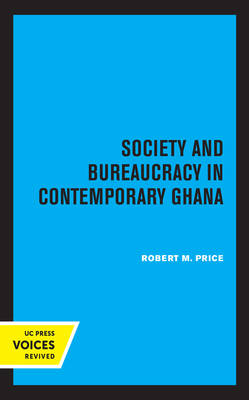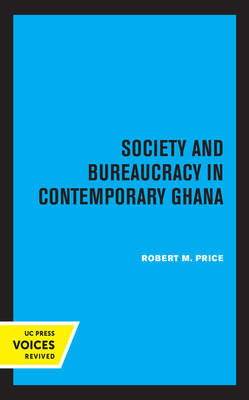
Bedankt voor het vertrouwen het afgelopen jaar! Om jou te bedanken bieden we GRATIS verzending (in België) aan op alles gedurende de hele maand januari.
- Afhalen na 1 uur in een winkel met voorraad
- In januari gratis thuislevering in België
- Ruim aanbod met 7 miljoen producten
Bedankt voor het vertrouwen het afgelopen jaar! Om jou te bedanken bieden we GRATIS verzending (in België) aan op alles gedurende de hele maand januari.
- Afhalen na 1 uur in een winkel met voorraad
- In januari gratis thuislevering in België
- Ruim aanbod met 7 miljoen producten
Zoeken
€ 67,95
+ 135 punten
Uitvoering
Omschrijving
Society and Bureaucracy in Contemporary Ghana by Robert M. Price examines the organizational dynamics of the Ghanaian civil service as a key to understanding the constraints facing postcolonial African states. Price begins with the premise that independence brought sovereignty but not unconstrained capacity for autonomous action: choice for African states was quickly tempered by economic dependency and weak internal institutions. In this context, the bureaucratic machinery of the state becomes central, both as the instrument for economic transformation and as the locus where citizens experience government. Drawing on role theory and ecological perspectives, Price argues that Ghana's administrative system illustrates how "traditional" obligations--kinship ties, clientelism, and personalistic networks--pervade formally modern bureaucratic structures, producing a hybrid or "poly-normative" system. Through extensive surveys of civil servants and their clientele, he demonstrates how kinship obligations shape bureaucratic role performance, how corruption emerges as a patterned adaptation rather than an aberration, and how weak organizational commitment undermines both efficiency and legitimacy. The book situates the Ghanaian case within wider debates about modernization, institution building, and administrative theory. Price critiques psychological explanations of bureaucratic weakness that emphasize maladjustment, instead showing how systemic role conflicts and incongruities structure everyday administrative behavior. Detailed chapters analyze familial obligations of bureaucrats, client-service relationships, and the mechanisms of corruption, demonstrating how these are embedded in Ghana's broader social order. He further explores how incentives, recruitment, and organizational culture shape role orientations within the civil service. The conclusion emphasizes that Ghana's experience illustrates the vulnerability of new states: where diffuse legitimacy is lacking, the performance of bureaucracy directly affects political stability and state survival. Society and Bureaucracy in Contemporary Ghana thus advances both a rich empirical account of Ghana's public administration and a general theoretical framework for understanding the social foundations of bureaucratic behavior in transitional societies. This title is part of UC Press's Voices Revived program, which commemorates University of California Press's mission to seek out and cultivate the brightest minds and give them voice, reach, and impact. Drawing on a backlist dating to 1893, Voices Revived makes high-quality, peer-reviewed scholarship accessible once again using print-on-demand technology. This title was originally published in 1975.
Specificaties
Betrokkenen
- Auteur(s):
- Uitgeverij:
Inhoud
- Aantal bladzijden:
- 277
- Taal:
- Engels
Eigenschappen
- Productcode (EAN):
- 9780520331501
- Verschijningsdatum:
- 30/07/2021
- Uitvoering:
- Paperback
- Formaat:
- Trade paperback (VS)
- Afmetingen:
- 152 mm x 229 mm
- Gewicht:
- 408 g

Alleen bij Standaard Boekhandel
+ 135 punten op je klantenkaart van Standaard Boekhandel
Beoordelingen
We publiceren alleen reviews die voldoen aan de voorwaarden voor reviews. Bekijk onze voorwaarden voor reviews.









